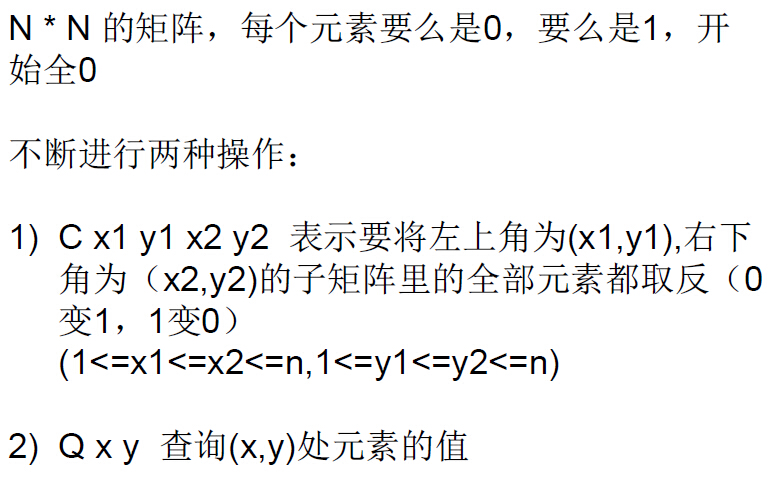poj 2155:Matrix(二维线段树,矩阵取反,好题)
Matrix
| Time Limit: 3000MS | Memory Limit: 65536K | |
| Total Submissions: 17880 | Accepted: 6709 |
Description
Given an N*N matrix A, whose elements are either 0 or 1. A[i, j] means the number in the i-th row and j-th column. Initially we have A[i, j] = 0 (1 <= i, j <= N).
We can change the matrix in the following way. Given a rectangle whose upper-left corner is (x1, y1) and lower-right corner is (x2, y2), we change all the elements in the rectangle by using "not" operation (if it is a '0' then change it into '1' otherwise change it into '0'). To maintain the information of the matrix, you are asked to write a program to receive and execute two kinds of instructions.
1. C x1 y1 x2 y2 (1 <= x1 <= x2 <= n, 1 <= y1 <= y2 <= n) changes the matrix by using the rectangle whose upper-left corner is (x1, y1) and lower-right corner is (x2, y2).
2. Q x y (1 <= x, y <= n) querys A[x, y].
We can change the matrix in the following way. Given a rectangle whose upper-left corner is (x1, y1) and lower-right corner is (x2, y2), we change all the elements in the rectangle by using "not" operation (if it is a '0' then change it into '1' otherwise change it into '0'). To maintain the information of the matrix, you are asked to write a program to receive and execute two kinds of instructions.
1. C x1 y1 x2 y2 (1 <= x1 <= x2 <= n, 1 <= y1 <= y2 <= n) changes the matrix by using the rectangle whose upper-left corner is (x1, y1) and lower-right corner is (x2, y2).
2. Q x y (1 <= x, y <= n) querys A[x, y].
Input
The first line of the input is an integer X (X <= 10) representing the number of test cases. The following X blocks each represents a test case.
The first line of each block contains two numbers N and T (2 <= N <= 1000, 1 <= T <= 50000) representing the size of the matrix and the number of the instructions. The following T lines each represents an instruction having the format "Q x y" or "C x1 y1 x2 y2", which has been described above.
The first line of each block contains two numbers N and T (2 <= N <= 1000, 1 <= T <= 50000) representing the size of the matrix and the number of the instructions. The following T lines each represents an instruction having the format "Q x y" or "C x1 y1 x2 y2", which has been described above.
Output
For each querying output one line, which has an integer representing A[x, y].
There is a blank line between every two continuous test cases.
There is a blank line between every two continuous test cases.
Sample Input
1 2 10 C 2 1 2 2 Q 2 2 C 2 1 2 1 Q 1 1 C 1 1 2 1 C 1 2 1 2 C 1 1 2 2 Q 1 1 C 1 1 2 1 Q 2 1
Sample Output
1 0 0 1
Source
POJ Monthly,Lou Tiancheng
二维线段树,矩阵取反,好题。
题意:

思路:
矩阵节点的值为是否取反,0为不取反,1为取反,暂称为取反值。
取反操作的时候先找到这个矩阵代表的节点,然后将这个节点的值+1再模2,即取反。
查询的时候,将(x,y)这个坐标经过的所有矩阵的取反值加起来,每次%2,最后那个值就为这个坐标最后的值。
为什么%2,因为不是1就是0,矩阵记录了取反值,找这个坐标的过程中,经过的矩阵如果取反值为1,则结果变为0,在经过一个取反值为1的矩阵,结果又变为1…… 直到加到要找的坐标的取反值,这个结果记录的值就是这个坐标的取反值。这个时候输出结果。
代码:
1 #include <iostream>
2 #include <stdio.h>
3 #include <string.h>
4 using namespace std;
5
6 #define MAXN 1100
7
8 int tree[MAXN*3][MAXN*3],s;
9
10 void Negate_y(int d,int dy,int L,int R,int y1,int y2) //取反操作
11 {
12 if(L==y1 && R==y2){ //将这个矩阵的所有元素记录为取反
13 tree[d][dy] = (tree[d][dy]+1) % 2;
14 return ;
15 }
16
17 int mid = (L+R)>>1;
18 if(mid>=y2)
19 Negate_y(d,dy<<1,L,mid,y1,y2);
20 else if(mid<y1)
21 Negate_y(d,dy<<1|1,mid+1,R,y1,y2);
22 else{
23 Negate_y(d,dy<<1,L,mid,y1,mid);
24 Negate_y(d,dy<<1|1,mid+1,R,mid+1,y2);
25 }
26 }
27
28 void Negate_x(int d,int L,int R,int x1,int y1,int x2,int y2) //取反操作
29 {
30 if(L==x1 && R==x2){ //找到行块
31 Negate_y(d,1,1,s,y1,y2);
32 return ;
33 }
34
35 int mid = (L+R)>>1;
36 if(mid>=x2)
37 Negate_x(d<<1,L,mid,x1,y1,x2,y2);
38 else if(mid<x1)
39 Negate_x(d<<1|1,mid+1,R,x1,y1,x2,y2);
40 else{
41 Negate_x(d<<1,L,mid,x1,y1,mid,y2);
42 Negate_x(d<<1|1,mid+1,R,mid+1,y1,x2,y2);
43 }
44 }
45
46
47 int Query_y(int d,int dy,int L,int R,int r) //查询
48 {
49 if(L==R) //找到要找的坐标,输出这个坐标对应的值
50 return tree[d][dy];
51
52 //没找到
53 int mid = (L+R)>>1;
54 if(mid >= r)
55 return (Query_y(d,dy<<1,L,mid,r)+tree[d][dy]) % 2;
56 else
57 return (Query_y(d,dy<<1|1,mid+1,R,r)+tree[d][dy]) % 2;
58 }
59
60 int Query_x(int d,int L,int R,int l,int r) //查询
61 {
62 if(L==R){ //找到要找的行块,继续查找列块
63 return Query_y(d,1,1,s,r);
64 }
65
66 //没找到
67 int mid = (L+R)>>1;
68 if(mid >= l)
69 return (Query_x(d<<1,L,mid,l,r) + Query_y(d,1,1,s,r)) % 2;
70 else
71 return (Query_x(d<<1|1,mid+1,R,l,r) + Query_y(d,1,1,s,r)) % 2;
72 }
73
74 int main()
75 {
76 int X,T,x,y,x1,y1,x2,y2;
77 scanf("%d",&X);
78 while(X--){
79 memset(tree,0,sizeof(tree));
80 scanf("%d%d",&s,&T);
81 while(T--){
82 char c[5];
83 scanf("%s",c);
84 if(c[0]=='C'){
85 scanf("%d%d%d%d",&x1,&y1,&x2,&y2);
86 Negate_x(1,1,s,x1,y1,x2,y2);
87 }
88 else if(c[0]=='Q'){
89 scanf("%d%d",&x,&y);
90 printf("%d\n",Query_x(1,1,s,x,y));
91 }
92 }
93 if(X!=0)
94 printf("\n");
95 }
96
97 return 0;
98 }
Freecode : www.cnblogs.com/yym2013



 浙公网安备 33010602011771号
浙公网安备 33010602011771号